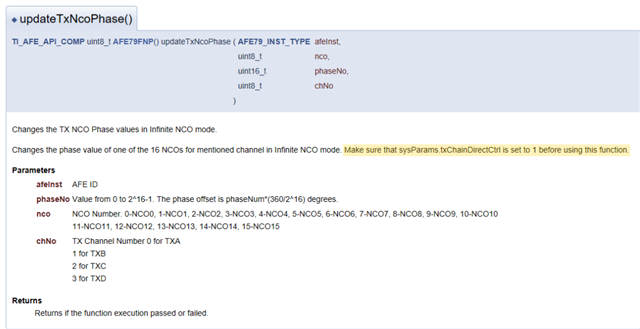Other Parts Discussed in Thread: AFE7920
Tool/software:
We use the AFE7920EVM board connected to an AMD Zynq UltraScale+ in JESD204B to perform both Rx and Tx acquisitions in the GNSS frequency range (basically, from 1160 to 2500 MHz).
We need to be phase aligned between our 4 Rx channels. Same between the 4 Tx channels.
We are OK to have a phase difference between the channels, but we need it to be constant in time and between system restarts so we can compensate it.
The Zynq configures the AFE7920 using SPI, running the CAFE library. The initial configuration was dumped using Latte running python scripts, and we now load it at start using the generated binary file.
Our setup is the following :
- IQ sampling rate is 184.32 MHz
- For Rx, we connect a CW generator centered on 1575 MHz with a splitter 1 -> 4 on the 4 Rx input. We receive the 4 channels in the Zynq using the JESD204B link.
- For Tx, we generate a CW of 1 MHz in the FPGA part of Zynq on the 4 channels (data are strictly identical between the 4 channels), and we send it to the AFE using the JESD204B link. AFE is configured to transmit it at 1575 MHz.
In Rx, everything is fine, phase difference between the 4 Rx channels is constant (+/- 0.6 degrees) over time and between system restarts.
In Tx, this is not the case. Phase difference between the 4 Tx channels is constant over time, but greatly varies between system restarts, and even when stop/starting transmission without system reboot.
Basically, after init, we use the CAFE function updateTxNco for each of the Tx channels to set transmission frequency. This is what we do also when stop/starting transmission (we set again the same frequency).
I have the impression that the NCOs of the Tx channels do not have the same phase as they are not started simultaneously.
What shall we do to always have the same phase difference in Tx ?
Thanks & regards,
Florian.



